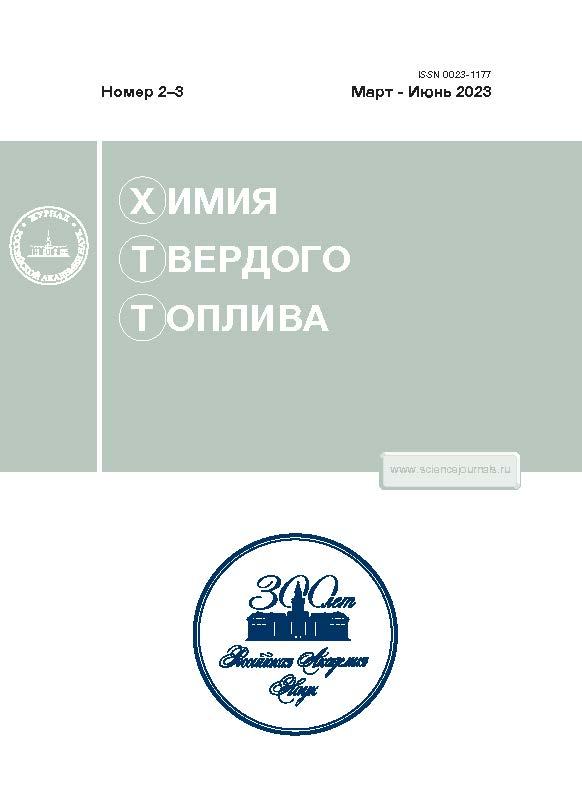Changes in the Structure of Asphaltene Molecules in the Process of Initiated Cracking of Tars
- Authors: Goncharov A.V.1, Krivtsov E.B.1
-
Affiliations:
- Institute of Petroleum Chemistry, Siberian Branch, Russian Academy of Sciences
- Issue: No 2-3 (2023)
- Pages: 99-106
- Section: Articles
- URL: https://ter-arkhiv.ru/0023-1177/article/view/661942
- DOI: https://doi.org/10.31857/S0023117723020056
- EDN: https://elibrary.ru/BFDZSN
- ID: 661942
Cite item
Abstract
The results of a study of asphaltenes isolated from the liquid products of tar cracking performed at a temperature of 500°C in the presence of didodecanoyl peroxide are presented. The reactions rate constants of the thermal transformations of asphaltenes in the studied tars were calculated. It was found that the reaction rate of asphaltene condensation into solid compaction products depends not only on the initial asphaltene content of tars but also on the molecular structure. Changes in the structural group parameters of tar asphaltenes in the course of initiated cracking were established. It was shown that the destruction of structural blocks without changes in their number in the molecular composition is a distinctive feature of asphaltene cracking in the presence of didodecanoyl peroxide. Averaged asphaltene molecules became more compact due to the destruction of aliphatic substituents and naphthenic rings, and the fraction of condensed aromatic structures in their composition increased significantly.
About the authors
A. V. Goncharov
Institute of Petroleum Chemistry, Siberian Branch, Russian Academy of Sciences
Email: mad111-2011@mail.ru
Tomsk, 634055 Russia
E. B. Krivtsov
Institute of Petroleum Chemistry, Siberian Branch, Russian Academy of Sciences
Author for correspondence.
Email: john@ipc.tsc.ru
Tomsk, 634055 Russia
References
- Jansen T., Guerry D., Leclerc E., Ropars M., Lacroix M., Geantet C., Tayakout-Fayolle M. // Ind. Eng. Chem. Res. 2014. V. 53. P. 15852. https://doi.org/10.1021/ie502242f
- Billups W.E., Verma M., Brinson B.E., Vishnyakova E., Alemany L.B., Shammai M. Energy Fuels. 2019. V. 33. P. 8040. https://doi.org/10.1021/acs.energyfuels.9b01298
- Капустин В.М., Глаголева О.Ф. // Нефтехимия. 2016. Т. 56. № 1. С. 3. [Petrol. Chemistry, 2016, vol. 56, no. 1, p. 1. https://doi.org/10.1134/S0965544116010035].https://doi.org/10.7868/S0028242116010032
- Akimov A.S., Sviridenko N.N. // J. Pet. Sci. Technol. 2022. V. 40. P. 980. https://doi.org/10.1080/10916466.2021.2008973
- Chen L., Meyer J., Campbell T., Canas J., Betancour S.S., Dumont H., Forsythe J.C., Mehay S., Kimball S., Hall D.L., Nighswander J., Peters K.E., Zuo J.Y., Mullins O.C. // Fuel. 2018. V. 221. P. 216. https://doi.org/10.1016/j.fuel.2018.02.065
- Alimohammadi S., Zendehboudi S., James L. // Fuel. 2019. V. 252. P. 753. https://doi.org/10.1016/j.fuel.2019.03.016
- Кривцов Е.Б., Головко А.К. // Химия в интересах устойчивого развития. 2019. Т. 27. № 1. С. 31. https://doi.org/10.15372/KhUR20190105
- Гончаров А.В., Кривцов Е.Б. // ХТТ. 2022. № 2. С. 26. [Solid Fuel Chemistry, 2022, vol. 56, no. 2, p. 108. https://doi.org/10.3103/S0361521922020136].https://doi.org/10.31857/S002311772202013X
- Сергиенко С.Р., Таимова Б.А., Талалаев Е.И. Высокомолекулярные неуглеводородные соединения нефти. Смолы и асфальтены. М.: Наука, 1979. 269 с.
- Дмитриев Д.Е., Головко А.К. // Нефтехимия. 2010. Т. 50. № 2. С. 118. [Petrol. Chemistry, 2010, vol. 50, no. 2, p. 106. https://doi.org/0.1134/S0965544110020040].
Supplementary files











